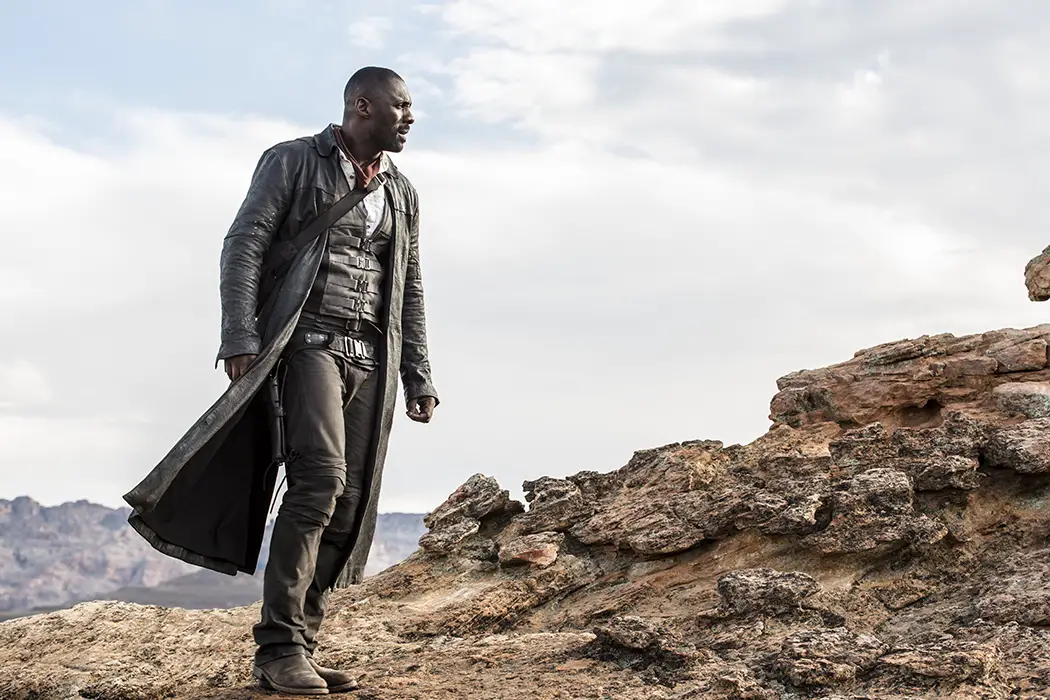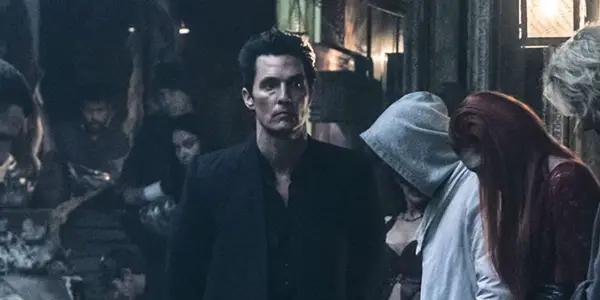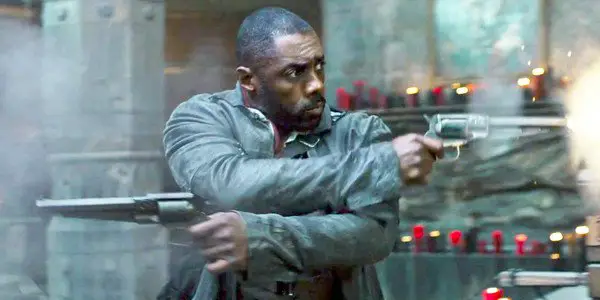THE DARK TOWER: Inklings Of Potential, But Its Troubled Production Shows

David is a film aficionado from Colchester, Connecticut. He enjoys…
The Dark Tower, the adaptation of Stephen King‘s eight-novel epic, was perhaps doomed from the start. Over a course of 10 years, the project underwent multiple changes in director, screenplay, and cast. Past plans included a trilogy of films, a TV series, and, at one point, a mixture of both. Even now, with a film produced (but not doing as well as hoped), it is uncertain about the future of this franchise.
It’s not too surprising that a series which expands multiple worlds, innumerable characters, and vast, sometimes confusing plot lines would be hard to adapt. To be completely honest, though I am a fan of King‘s work as a whole, I couldn’t quite make it past the first two novels for this very same reason (though I’ve always wanted to give it another go). Yet, despite the inherent difficulties behind this adaptation, it was my sincere hope that the final result would at least approach something worthwhile. And while Nikolaj Arcel‘s film isn’t a complete disaster, it’s still not strong enough to justify its existence.
A film lost in its own mythos
The premise of The Dark Tower is as follows: there are multiple worlds that exist outside of our own. A giant Tower stands between them, holding their very fabric together. Jake (Tom Taylor), an 11-year-old kid from New York City, is haunted by visions of this Tower, and also witnesses a sinister-looking Man in Black and a gunslinger who fights against him. Determined to see if his dreams are real, he soon finds his way to an abandoned building from one of his visions, which has a portal to another world hidden within it. Adventure ensues as Jake finds himself swept up in a war between the gunslinger, named Roland Deschain (Idris Elba) and Walter o’Dim, the Man in Black (Matthew McConaughey), who wants nothing more than to tear down the Tower, bringing about the destruction of the universe in the process.
The outline of a potentially engaging story is there, not only with the idea of a pseudofather-son connection between Jake and Roland, but also with the classic quest of good vs. evil, which takes place within a desolate old West-style world. Where the film falters, though, is with its shoestring thread of a plot and its underdeveloped characters. Perhaps the real issue is, as alluded to before, that The Dark Tower is such a vast and complicated story, so rather than attempt to adapt all of the novels, this film is instead meant to be a sequel to the final book, which premiered in 2012. So, it could potentially satisfy both newcomers and loyal readers of the series.

Yet, at only 95 minutes long, the film rushes through both its exposition and potential world-building at each new location. It dashes from one action set piece to the next, barely taking the time to breathe between them, and not allowing the audience to establish a hold on either what exactly is happening or who these characters are that it is happening to. Far from accessible, those unfamiliar with the series will likely be even more confused, as the film expects you to already know both the series and the characters within it.
In addition to this, the film tries to bite off more than it can chew. Loyal Stephen King fans already know that all his books are supposed to be set in the same universe, with the Dark Tower series essentially connecting them all together. The Dark Tower movie attempts to follow suit; for example, within it there are references to The Shining, It, Christine, and Carrie. But, as opposed to feeling like these references were just made in good fun, it instead made me even more confused. Is this movie now supposed to be seen as the first in a Stephen King Connected Universe (a SKCU), or is it a movie that connects all prior adaptations instead?
In our current movie world, where multiple film series are connected to one another through established worlds, the choice to even hint at the creation of a cinematic universe is one that is questionable at best, especially here, where one reference in particular makes up a major plot point. Now, people are going to incessantly attempt to connect all subsequent King adaptations as opposed to simply enjoying them on their own. The upcoming It remake, for example – is it part of the same cinematic world as The Dark Tower?
Individual standouts
Though outweighed by its flaws, there are some individually commendable aspects of The Dark Tower. First and foremost is Idris Elba as Roland Deschain. With his long black coat and double old West style six-shooters, Elba easily looks the part, and he has the charisma to back it up as well, perfectly encapsulating the stern and commanding presence of the character from the novels. He’s what you would get if you mixed Clint Eastwood‘s Man With No Name with Mel Gibson‘s Mad Max, yet Elba also plays the character with a warm sensitivity, making him immediately likable. Only through Elba‘s calm, pleasant-sounding voice could the line “I kill from my heart” somehow sound justifiable.

Matthew McConaughey‘s Man in Black is far less compelling. While McConaughey plays him reasonably well, managing to lower his Southern drawl into a more menacing cadence, the character is just so generically villainous. An example is when something goes wrong in the course of his plan to take down the Tower, and he immediately lashes out at the person standing closest to him, as if to somehow further instill the idea that he is unconscionably bad. Yet, his very purpose should stand for itself – he wants to bring down a Tower to bring about the end of all mankind, after all – we don’t need numerous examples of a bad guy doing bad things to drive this point home.
Newcomer Tom Taylor, who plays Jake, doesn’t give a particularly noteworthy performance, but he does stand on his own against such distinguished actors as Elba and McConaughey. Though not given much of a chance to show more acting range given the limited scope of the story itself, I could see Taylor maturing with the character if an eventual TV series is made. Other than these three, there aren’t any other performances worth mentioning; as alluded to before, the film’s characters are either poorly developed or very underused.
A mixture of inspired and CGI-ridden action
There is at least one inspired moment within The Dark Tower (shown in the trailer as well) when it comes to the action scenes. In it, Roland is attempting to shoot a bad guy that had run off with Jake. Rather than chase after him, though, he simply waits, raises his gun silently, and without even looking shoots at the guy from a distance, hitting him directly. It’s a heightened, silly moment to be sure, but it’s also a hint at what could have been; the film is riddled with monsters, multiple worlds, and magic, after all – why not have some fun with it as well?

Unfortunately, these moments are few and far between. The final battle, which consists of Roland against a multitude of gun-wielding bad guys, is occasionally entertaining, especially when Tom Holkenborg‘s score picks up during a climactic moment. Yet, as is the case with most modern action films, the CGI is still at times too invasive. As the film itself is part Western, it was my hope that there would be more at least a few quick-cutted Sergio Leone-style or even more subdued classic Western gun fights, but Arcel instead ramps up the action during these scenes as opposed to making an occasional homage to the classics.
Verdict: The Dark Tower
To conclude, Nikolaj Arcel‘s The Dark Tower isn’t a particularly loathsome film. It’s just not particularly praiseworthy either, with the only highlights really being Idris Elba‘s performance and some occasional passable action sequences. And for a film based on an eight-book sprawling epic written over the course of 30 years by one of the most prolific fiction writers working today, that’s just not quite enough.
What did you think of The Dark Tower? Do you think Stephen King’s epic series is too large in scope to adapt into a film?
The Dark Tower was released in US theaters on August 4 and will be released in the UK on August 18. For all international release dates, click here.
Does content like this matter to you?
Become a Member and support film journalism. Unlock access to all of Film Inquiry`s great articles. Join a community of like-minded readers who are passionate about cinema - get access to our private members Network, give back to independent filmmakers, and more.
David is a film aficionado from Colchester, Connecticut. He enjoys writing, reading, analyzing, and of course, watching movies. His favorite genres are westerns, crime dramas, horror, and sci-fis. He also enjoys binge-watching TV shows on Netflix.













